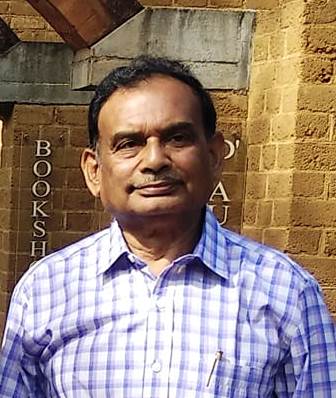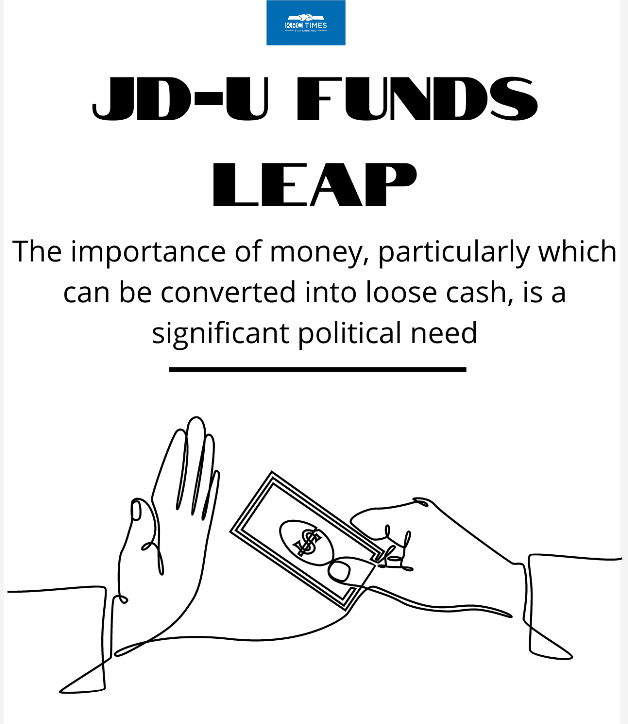The JD-U Chief Minister Nitish Kumar received Rs 60.15 crore, the highest donation among 54 regional parties, in 2020-21 as per figures submitted to the Election Commission
 Shivaji Sarkar
Shivaji Sarkar

The corporate know how best to invest and reap dividends. Long before a sleuth could know, the investments in JD-U’s fortune were soaring. Yes, it is the party with donations of Rs 160 crore in a short span, the largest among regional parties for some time.
Its luck smiled long before it was known to change its alliance partner in Bihar this month and Nitish Kumar formed the government with RJD dumping the BJP. If the donations were in anticipation of the miracle, the donors must be complimented for their foresight and speculative capacity. Having been with the BJP, Nitish Kumar realises the importance of the purse in a volatile political situation.
The JD-U Chief Minister Nitish Kumar received Rs 60.15 crore, the highest donation among 54 regional parties, in 2020-21 as per figures submitted to the Election Commission. It was followed by the DMK – Rs 33.99 crore and AAP – 11.32 crore, the Indian Union Muslim League Rs 4.16 crore, Telangana Rashtra Samithi Rs 4.15 crore. Even the Samajwadi Party with Rs 50.44 crore before the Uttar Pradesh elections in 2020-21 was a laggard.
With the maximum number of donations during FY 2020-21, JD(U) declared 58 donations from corporate/business sectors amounting to Rs 60 crore, while 272 individual donors donated Rs 90.60 lakh. It has not stopped there. In February 2022, JD-U Bihar President Umesh Kushwaha announced that during a fortnight of starting a fund-raising campaign, it received Rs 100 crore as donations from, “leaders, supporters, and workers, showing the popularity of Chief Minister Nitish Kumar”. He hoped at that time that by March the party would get Rs 300 crore. This was not confirmed.
With regard to the total amount of donations, the Shiv Sena leads with Rs 62.859 crore from 436 donations, followed by the All India Anna Dravida Munnetra Kazhagam (AIADMK), which has declared receiving Rs 52.17 crore from three donations.
In 2019-20, corporate and businesses donated Rs 931.95 crore to national parties. The BJP had the highest with Rs 720.4 crore. At Rs 4847 crore, it has the highest assets among the top seven parties. The Congress was a distant second, with Rs 55.36 crore received from 151 corporate donors. During the two-year period, the report said that the BJP and Congress’s voluntary contributions above Rs 20,000 from corporate or business houses were 94 percent and 81 percent respectively.
In such a scenario, the JD-U has seemingly changed its tack. It has apparently introduced a regular levy system on its leaders, office-bearers and other workers. Even Deputy Chairman Rajya Sabha Harivansh Narayan Rai is regularly contributing to it. But it has never been averse to corporate donations.
The importance of money, particularly which can be converted into loose cash, is a significant political need. It helps the party in its penetration to different areas, influences its supporters, and organise various other activities in an easy manner. That JD-U has an ambition and its leader Nitish Kumar pines to become a key political player is no secret. In such operations, seeking donations is normal. Its corporate donors are groups from Bihar, West Bengal, Delhi, Noida, and Mumbai among other places.
Political parties are associations of people who are working for the nation and its populace. Often the rules of donations have been changed. Former Prime Minister Indira Gandhi had totally banned it. But it was not found to be practical. In 2016, the concept of anonymous corporate bonds was issued. There are still concerns and changes may be likely.
In such a scenario, anonymous bonds supposedly keep the donors’ identities a secret. Technically, it is so but in reality, may not be. It shows a corporate tilt for the parties in power. There are expectations from the party as well as the donors. Seeking favours may be easy but obliging in a structured framework is never easy. But corporate is known to have flourished with the proximity they have with the powers that be. An Asian house recently donated a huge sum to major Australian parties and got a business foothold.
So the expectations for the rise of the JD-U are natural. The recent move by Nitish Kumar is seemingly appreciated by the corporate group. Despite it is not such a big event on the pan-Indian canvas, it has been a major deviation from the usual one-sided political development. It has given a jolt to many players, who want to be on the right side of any political dispensation. Business leaders despite being sceptical do not rule out a change. They are silent but have reportedly activated the systems to take care of their interests.
Donations do not establish a direct quid pro quo. However, the proximity it allows helps curry out favours not only to the party but individual leaders who shape the party. The perceptional aspects change how a favour would be carried out or not. Bihar elections are three years away but the Lok Sabha polls less than two years from now may see a keen tussle. The JD-U moves may be keenly watched and help it gain more financial support from a larger catchment area.
This apart, the Nitish Kumar-Tejasvi Yadav duo has to take steps to change the economic fundamentals of Bihar with more investments. That would be an opportunity for the corporate to grab. Those who believe that it is hinged on only the Lok Sabha polls may not be right. The overall well-being of Bihar has a lot to do with the fortunes of the new Mahagathbandhan alliance. This is a singular opportunity they have got to prove themselves.
Nitish Kumar no more has the benefit of the aura of Prime Minister Narendra Modi to sail through. He has to build the new alliance as the change model may be beyond Bihar. If it succeeds his donation kitty would increase, and so may his clout. But if he cannot, it may be a run-away success for his opponents who might romp Bihar and elsewhere.
The Nitish donation story is significant today for the success or not of the new daring model that he has tried to set up. The mere rise in donations, which is most likely, may not be enough unless it bites politically and changes the overall course of Bihar. It will be interesting to watch how the waves of Bihar sweep the course. —INFA
Advertisement | KRC Foundation

To know more, visit: https://bit.ly/3KVFnRq


